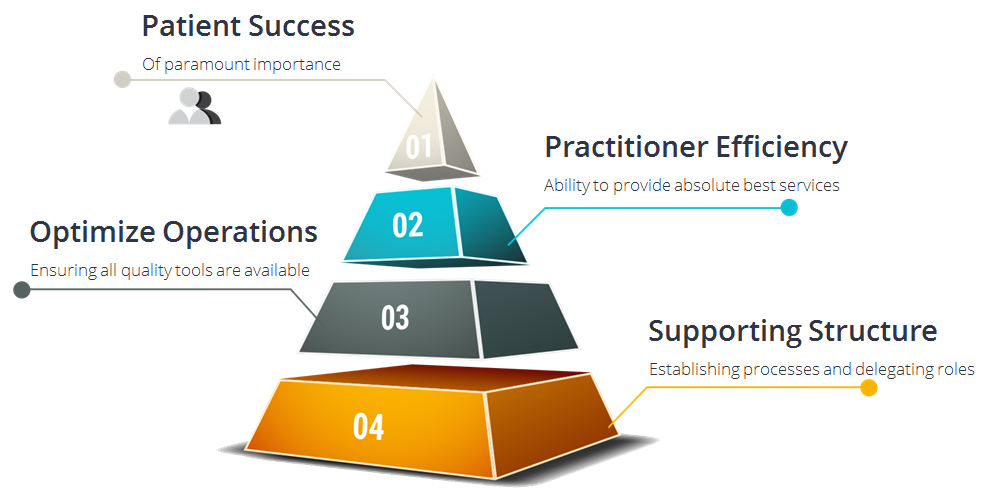Here’s why I’m even writing this article. The traditional health care system as we know it reduces your control over your own health. Insurance companies dictate who you go to, how much you pay, and unfortunately, your quality of care. Let’s face it – this is one of the fundamental ways the system is broken. Physicians are too busy to fill out insurance paperwork to spend the necessary time to properly assess a patient’s care. This can be changed, however, when you consider the alternative: paying out-of-pocket. You might feel nervous about the difference in financial requirements, but changing how you pay for healthcare might be a better long-term investment simply by reducing how much time is wasted on multiple doctor’s visits coupled with a higher chance of recovery.
And with insurance premiums skyrocketing as much as 78%, a rising level of dissatisfaction from both patient and practitioner with the care and options available, and so many integrative and alternative treatments that show great clinical promise falling out of coverage, the decision maybe shouldn’t be so difficult. In fact, it may greatly improve the outcome of your health, and ultimately, lead to a better quality of life.
It really boils down to value – receiving the best care, without limitations, and getting real results that allow you to live healthy and happy again. This out-of-pocket model also allows your healthcare provider to help you via a large number of options that would not be available to them if they were handcuffed by insurance.
Nevertheless, I understand how many would scoff at the idea of paying what seems like exorbitant amounts of money on medical treatment when so much of medicine is covered by insurance (which you or your employer is already paying for). So let me break it down for you.
Reasons to Go Out-of-Pocket
I still remember when my father made the jump from an insurance-based medical office to going out-of-pocket. His colleagues at the hospital told him he’d be out of business within a year. And there was definitely some trepidation on his side – doctors just don’t go from running successful booming practices that collect insurance to suddenly asking people to pay for their treatments. But that’s what he did, and in doing so created a center that put the patient and healing first, cut the red-tape, and thrived to where it became a first-class medical center that patients from around the world come to get better and doctors come to learn. With that said, here are the reasons you should consider paying for your medical treatments out-of-pocket.
You’ll Receive Better Care
The main focus of any patient should be on receiving optimal care that will lead them back to sustainable health or prevent disease (can’t forget the importance of prevention). This is what is called a ‘Patient-Centric Results-Based Model‘, in which the most critical and paramount goal (or top of the pyramid) is always to produce the highest levels of patient success through the complete restoration of health. All subsequent levels are therefore optimized to achieve this goal, and doctors or practitioners who work in this model focus solely on healing. They aren’t troubled by other administrative and non-medical tasks.
A patient-first model for running an integrative medicine practice results in highest levels of success.

Running a patient-centric model is in contradiction with an insurance-run practice, in which a large portion of focus that should be directed towards you – the patient – is spent on paperwork and insurance claims. How much? Well in an article entitled “The bureaucratic hassles physicians face are extraordinary“, clinic staff spend more than 15 hours per week dealing with quality measures (like documenting paperwork for insurance purposes). But when you take insurance out of the equation and opt to pay out-of-pocket, you get the care you need, without distractions, leading me to our next point.
You’ll Spend More Time with the Doctor
I was at an event giving a talk (The Believe in Better Project – shoutout to an awesome event), and one of the running jokes of each presenter was the amount of time they spent with each patient. The point of it stemmed from the fact doctors are spending less time with their patients than ever before. Research has calculated the average time a physician spends with the patient is approximately 8 minutes. And because of insurance claims, the majority of time spent being a doctor is now occupied by paperwork. Now imagine another scenario where a physician is free to spend 30 minutes + with you and provide better personal care. You are able to build a better relationship with your doctor and a better understanding of the complexities of your current state of health. You start to build trust as well. This in turn leads to improved and more dedicated patient care, and better results for you, the patient. It also decreases restrictions presented by insurance-only medical care, such as the type of care covered or the number of appointments covered – which we’ll get into in more detail in later sections of this article.
To restrict the art of healing to doctors and deny equal privileges to others will constitute the Bastille of medical science. All such laws are un-American and despotic.”
Benjamin Rush

Better Compliance = Better Results
In today’s society, receiving the time and passion you require for your health is considered a premium service. But a growing number of people are gladly accepting this idea. In a JP Morgan article entitled “Key Trends in Healthcare Patient Payments,” a McKinsey study that was referenced within the article found that 74 percent of insured consumers indicated that they are both able and willing to pay their out-of-pocket medical expenses up to $1,000 per year.
Dubbed “self-pay patients,” this growing group has opted out of premium healthcare plans, going for bare-bone emergency care (high deductible plans, HSA accounts, etc.), and paying directly for their primary care. I find myself in this group, as well as a number of my colleagues and friends.
The result? They experience an improved doctor-patient relationship and even more interesting, they are more compliant with their healthcare treatment plan – indicating a higher level of responsibility and success.
This phenomena (if you could call it that) reminds me of a quote from writer and entrepreneur, Derek Sivers: “the more people pay for something, the more they value it.” Give them medical treatment for free (or a simple co-pay), and they’ll take it and probably continue the unhealthy habits that led to sickness. Make them pay for it, and suddenly they’re reading mindbodygreen articles, investing in a masticating juicer and downloading meditation apps (Inscape is my favorite).
The mere fact that all the costs of your health program are presented and there is a level of transparency and honesty that places a value on your treatment – a value which may become lost via insurance. Thus, the money you are spending on healthcare is an investment that requires you to become more responsible for the outcome. When you take more responsibility and comply with the advice and action recommended by your healthcare provider, you are more likely to achieve success and thus, better health.
Freedom of Choice
More and more, insurance companies are limiting not just specific therapies, but also the number of treatments they will cover. You become limited to a certain set of therapies approved by your insurance – whether they are truly beneficial or not. In a national survey of doctors published last May in the journal Health Affairs, it was determined physicians spent an average of 43 minutes each workday processing and working on insurance paperwork. That lost time costs practices a combined $31 billion each year, the study concluded. Paying out-of-pocket provides freedom and shifts the pendulum of power from the insurance companies back to your healthcare provider. In turn, it offers a situation where your doctor can make decisions or recommendations not based solely on what is covered by your insurance, but based on what is better for you – the patient.
Many doctors, including my father, agree. Dr. Szulc, as most call him, told me the following: “If a patient requires 10 treatment sessions, an insurance company may only allow 6 or so. Doctors are losing their freedom to practice medicine according to their knowledge and best interest for the patients, who put their trust in doctors’ hands. A secondary problem is that most beneficial non-allopathic therapies of integrative medicine are not covered by insurances which continuously deny payments for services. This creates a big dilemma and feeling of entrapment between insured patients, insurance companies, and physicians, who need to be reimbursed for their services in order to maintain viable practices. At the same time, patients believe that they are covered for their healthcare needs and that perhaps the doctor is not being completely honest with them and taking advantage of the situation by stating that the patient requires additional payment for services which are not covered by insurance. It creates an unhealthy situation and does not promote a healing atmosphere, but rather an environment of distrust and confusion, even in the most compassionate and dedicated medical practices.” Well said, pops.
It creates an unhealthy situation and does not promote a healing atmosphere, but rather an environment of distrust and confusion, even in the most compassionate and dedicated medical practices.”
Thomas K. Szulc, MD (AKA Dad to me)
See how we can help you restore complete health of body, mind & spirit.
Addressing Common Concerns
Change has an aura of the unknown. It sounds scary. And it may sound like a lot of money going out-of-pocket, especially for the lower to middle income group. But a percentage of healthcare expenses can be tax deductible. Some places also offer pro-bono medical services. There’s further various ways to finance health expenses via responsible credit or loans. And we’re living in a day and age where social media and crowdfunding allow us to be benevolent and give a little to someone in need of medical treatment. But I’m not saying this is for everyone – nothing is.
Overall, results speak louder than anything else. If your healthcare provider makes the recommendation that healthcare options outside of what your insurance covers may be worthwhile for you and your health, you may be posed with the dilemma of asking yourself if you would rather be in the insurance system and barely manage your condition for years, or if you would rather go somewhere that has a proven track record to restore health in the most efficient and effective manner possible? The answer is somewhat obvious. Time is money. And you regain back time through efficient and effective healthcare.
I was recently speaking with a patient who told me after spending tens of thousands of dollars at our medical center, “you know, I said I have a choice. I can either get a new car this year or I can get my health back. That’s an easy choice.” I loved that. She also continued to say how she’s feeling so alive and better than she did 20 and 30 years ago. Can you put a dollar amount on that feeling? That’s a question you need to ask yourself.
Unlike conventional healthcare programs, integrative clinics and practices, like the New York Center for Innovative Medicine (NYCIM), aim to solve the root of the problem through a wide range of different therapies and medicinal approaches. At NYCIM, our healthcare teams focus on solving the cause, so that you can enjoy those next 60 or so years of your life (yes, I do think you can live to 120 and beyond). In other words, you eventually gain your value back through time and life experience. And there is much more to be gained from healing as opposed to just managing a set of symptoms, which is what Innovative Medicine is all about.
Final Thoughts
Change is a critical component of growth, improvement and HEALING. The medical field is at a crossroads, and rather than continuing to do the same things that have led us to the problematic state we find ourselves in, taking bold steps and implementing changes that may go against conventional wisdom is precisely what is needed.
You aren’t limited to conventional and insurance-covered only treatments. There are options that can save you years of pain and help you regain back years of your life. Paying-out-of-pocket opens the doors for a more comprehensive and personalized treatment that will enable you to achieve better health and ultimately, a better life. Discuss your options with your doctor, and don’t let insurance coverage determine or limit the state of your health.
Is there some sacrifice involved. Absolutely. Maybe it means giving up the fancy car, or not getting a new TV, or simply saving every penny for a year and hitting up friends and family. But, in my honest opinion and those of so many patients that made the leap, it is worth it.
I’ll finish this off with one of my favorite quotes.
“The greatest wealth is health.” – Ralph Waldo Emerson
I wish you all become massively wealthy.
* Disclaimer: The statements made in this article have not been evaluated by the Food and Drug Administration. Any products or treatments mentioned are not intended to diagnose, treat, cure, or prevent any disease. Please consult a licensed medical practitioner for medical advice. At Innovative Medicine, we believe in transparency. We want you to know that we may participate in affiliate advertising programs pertaining to products mentioned herein.





